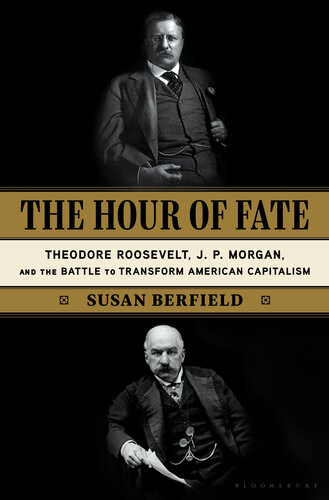
The Hour of Fate
Theodore Roosevelt, J.P. Morgan, and the Battle to Transform American Capitalism
کتاب های مرتبط
- اطلاعات
- نقد و بررسی
- دیدگاه کاربران
نقد و بررسی

March 30, 2020
Journalist Berfield debuts with a vivid account of the early 20th-century battle of wills between President Theodore Roosevelt and financier J.P. Morgan that led to the breakup of the Northern Securities railroad company. After highlighting the parallels between Morgan and Roosevelt’s early lives (both were born into the upper class, both had childhoods marked by illness), and documenting their divergent political and economic beliefs (Roosevelt became a progressive trust-buster; Morgan believed capitalism should be “orderly and concentrated, directed from above by powerful men”), Berfield expands the story to include labor leader John Mitchell, a driving force behind the 1902 United Mine Workers strike, which threatened both the railroad industry and America’s heating supply and led to the federal government’s first intervention in a labor dispute. Weaving together the perspectives of labor, capital, and government, Berfield documents the origins of reforms including the eight-hour workday and worker’s compensation; she finds drama in complex and potentially dry business transactions, and makes insightful comparisons to today’s progressive movement. This entertaining account will resonate with American history buffs and those who agree with Berfield that “the battle to make American capitalism more fair rages just as furiously” today as it did at the turn of the last century.

April 1, 2020
A focused history of the turn-of-the-century series of events during which President Theodore Roosevelt and railroad magnate J.P. Morgan clashed over power and boundaries, paving the way for a progressive moment in America. In her well-paced debut, Bloomberg Businessweek investigative reporter Berfield ambitiously juggles several historic threads from a turbulent time in America: soaring immigration, labor unrest in the face of low wages and dangerous conditions, the seemingly untrammeled ambitions of big business, and the clamor for public accountability and oversight. Following the assassination of William McKinley, Roosevelt assumed the presidency as a young, untested hero of the Spanish-American War. At the time, he was greatly feared by the Wall Street monopoly for his progressivism. Morgan had created the behemoth U.S. Steel, and he maintained firm control over the "coal roads" in Pennsylvania, the railroads, and Wall Street finance. In 1901, along with a few other titans, he formed the Northern Securities railroad trust; a year later, Roosevelt asked his attorney general to prosecute the corporation for violating the Sherman Antitrust Act, which had been passed into law in 1890. At this crucial historic intersection, writes the author in a particularly engaging section, "tens of thousands of miners were also demanding that the nation honor its commitment to justice even as the coal barons denied it. Their fight would become one of the greatest labor actions in American history, and would redefine Roosevelt's presidency in the months ahead." In October 1902, Morgan "committed a surprising act of diplomacy," bringing the coal barons together with labor leader John Mitchell, and the strike was settled. On March 14, 1904, the Supreme Court handed Morgan a stunning defeat, forcing Northern Securities to dissolve within 30 days. The decision, notes Berfield, cemented Roosevelt's popularity; he "had tipped the scales back toward ordinary Americans, and many were devoted to him." An engaging historical work involving truly larger-than-life American characters. (b/w images)
COPYRIGHT(2020) Kirkus Reviews, ALL RIGHTS RESERVED.

Starred review from May 1, 2020
Berfield (Bloomberg Businessweek) is no stranger to covering corporations as an investigative journalist. Her first book begins with the assassination of President William McKinley in 1901, describing in recurring fashion the recently sworn-in president, Theodore Roosevelt, and the capitalist of his time, J.P. Morgan. Originally thought of as a potential ally to Wall Street, having grown up wealthy himself, Roosevelt almost immediately struck out on his own; using the bully pulpit to try to reign in big business by suing Northern Securities, a massive railroad trust. Berfield expertly sets up this epic legal battle, ultimately decided in Roosevelt and the U.S. government's favor by the Supreme Court, intimately describing both Roosevelt and Morgan. While diving into the inner thoughts of his subjects, Berfield simultaneously encompasses the political and social revolt of the moment, examining the anthracite coal strike. Photographs are incorporated thought, along with a selected biography and end notes. VERDICT It's no easy task to write a dual biography while also incorporating the feelings and emotions of the historical moment, yet Berfield accomplishes all of this. An extremely readable work that will engage American history and business readers everywhere.--Keith Klang, Port Washington P.L., NY
Copyright 2020 Library Journal, LLC Used with permission.

April 15, 2020
The Gilded Age created many a millionaire and many an impoverished worker. Between those opposites stood American politicians, some corrupted by wealth, others determined to redress the economic gulfs that American industry might have created. Theodore Roosevelt, whose ambitions were almost unbounded, was something of a national hero before he joined the McKinley administration as vice president. An assassin's bullet propelled him into the presidency, much to the distress of moguls led by the fearsome J. P. Morgan. Morgan's machinations on the stock market, as he vied with other railroad barons to consolidate their hold on the burgeoning American West, led to calls for controls on their seemingly unlimited economic power. Then a strike by coal miners threatened both the railroads and the welfare of citizens as winter approached. Bloomberg Businessweek journalist Berfield well portrays the major characters of this struggle without excessive detail, and her insights into both Roosevelt and Morgan make them seem quite contemporary. Includes photographs and bibliographic notes.(Reprinted with permission of Booklist, copyright 2020, American Library Association.)

























دیدگاه کاربران